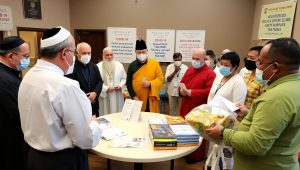
The COVID-19 pandemic has tested the resilience of communities around the world. In this challenging time, religious communities have emerged as key players in combating the spread of the virus, using both faith and action to protect their members and support public health initiatives. From adhering to safety protocols to offering resources for those in need, faith-based organizations have shown that their influence extends beyond spiritual care, playing a pivotal role in promoting public health and well-being during the pandemic.
The Power of Faith-Based Leadership
Religious leaders have a unique ability to influence their communities. During the COVID-19 crisis, many faith-based leaders were quick to take action, promoting the importance of safety measures such as mask-wearing, social distancing, and vaccination. By using their platforms to communicate public health messages, they helped foster trust in the science behind these recommendations, especially in communities where skepticism of government and medical advice might have been prevalent.
In some areas, religious leaders collaborated with public health officials to ensure that their messages aligned with local guidelines. By emphasizing that taking precautions is not only a responsibility to one’s own health but also an act of compassion toward others, they encouraged compliance with safety protocols in a way that resonated with their congregations.
Community Support and Relief Efforts
Beyond advocating for safety, many religious communities took tangible steps to provide support during the pandemic. Churches, mosques, synagogues, temples, and other places of worship became centers for community outreach and aid. Volunteers from religious communities organized food drives, distributed essential supplies, and provided financial assistance to those who lost jobs or were unable to work due to lockdowns.
Religious organizations also played an essential role in addressing the mental and emotional toll of the pandemic. Pastoral care, virtual counseling sessions, and phone calls to check in on vulnerable members were part of many religious institutions’ efforts to ensure the emotional well-being of their congregants during isolation. By fostering a sense of community, even virtually, religious groups helped people cope with the anxiety, loneliness, and uncertainty that came with the pandemic.
Faith-Based Organizations and Healthcare Initiatives
Religious communities have long been involved in healthcare, and during the pandemic, they expanded their efforts to help curb the spread of COVID-19. Many religious organizations offered their facilities as testing centers, vaccination sites, or distribution points for personal protective equipment (PPE). In areas with limited access to healthcare, these efforts were particularly important.
Faith-based hospitals and clinics, which serve millions around the world, also took on the challenge of providing COVID-19 care. Religious health organizations adapted quickly to new demands, ensuring that they could continue to treat both COVID-19 patients and others requiring medical attention. Their commitment to providing care, often at great personal and financial cost, underscored the role of religious communities in upholding public health.
Promoting Vaccination and Public Health Campaigns
As vaccines became available, many religious communities stepped up to advocate for vaccination as a moral responsibility. Religious leaders, motivated by teachings of love, responsibility, and care for others, helped to overcome hesitancy in some communities by encouraging their members to get vaccinated. Their support for vaccination efforts helped boost public confidence in the vaccines and contributed to the broader goal of achieving herd immunity.
In addition, religious organizations launched educational campaigns to dispel myths about the virus and vaccines, helping to address misinformation that had proliferated on social media and other platforms. These initiatives were particularly effective in reaching groups that may have been less likely to trust government-led health campaigns.
A Continued Commitment to Health and Safety
As the world continues to navigate the evolving landscape of COVID-19, religious communities remain an integral part of the solution. Their work in combating the virus, providing relief, and fostering a spirit of collective responsibility serves as a powerful reminder that faith and action can come together to protect and heal communities. Through ongoing vigilance, support for public health initiatives, and a commitment to service, religious communities continue to play a crucial role in stopping the spread of COVID-19 and supporting global recovery.
In these unprecedented times, the intersection of faith and public health has shown how religious communities, by acting with compassion and responsibility, can contribute significantly to overcoming global crises.